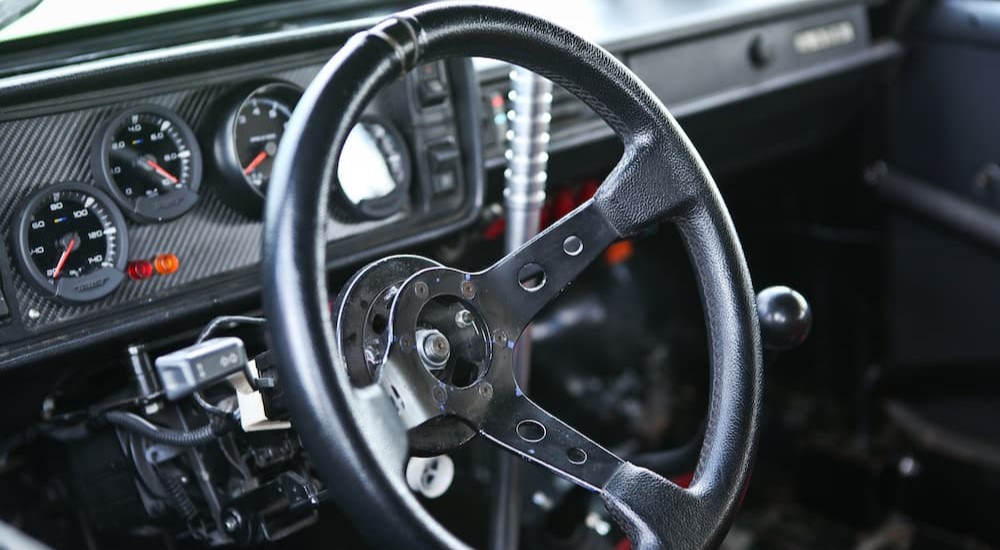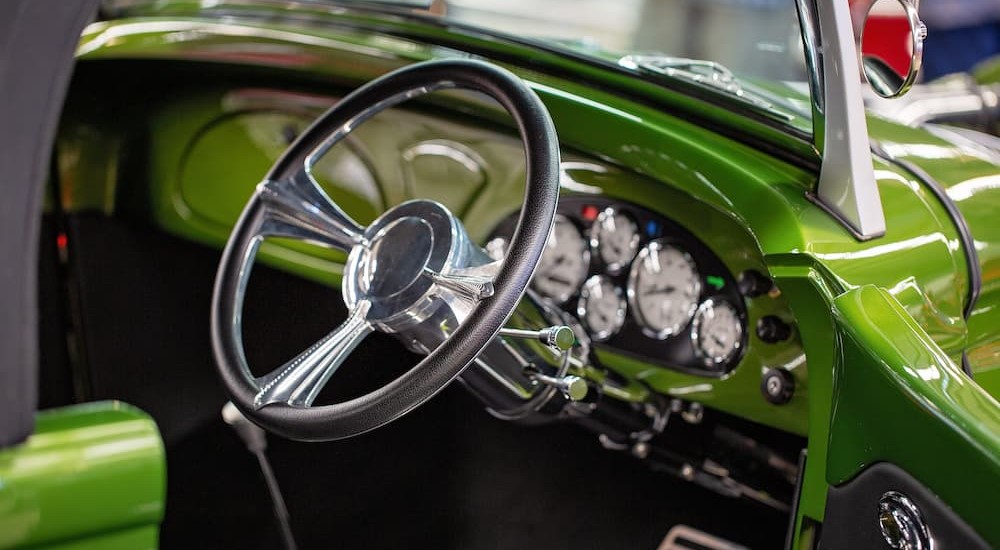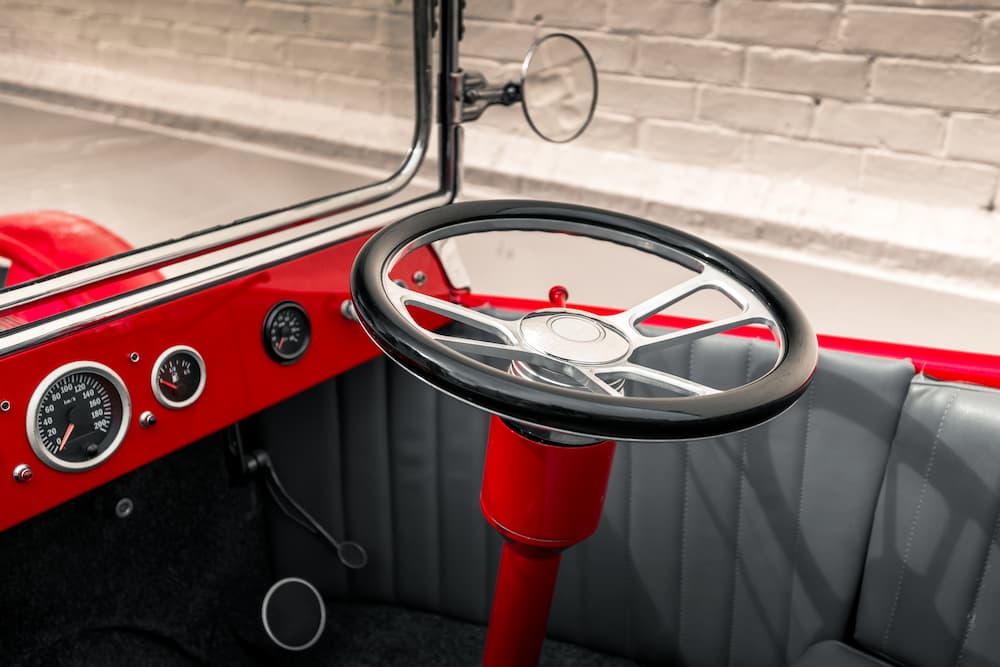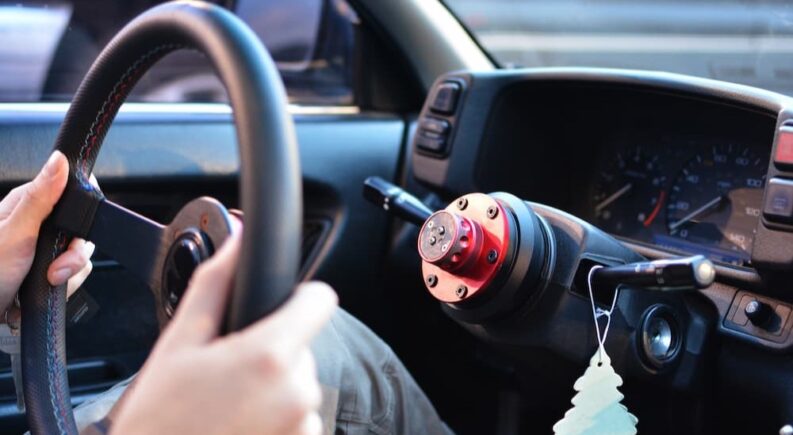When you’re looking to give your high-performance vehicle a little extra edge, there are plenty of options; from track tires and spoilers to racing seats, harnesses, and more, there is no shortage of aftermarket accessories catering to the would-be Formula One racer. While some are more about looking the part, others can have a real impact on overall performance, control, and comfort, giving you the edge you need to beat the clock and post a personal best.
An aftermarket steering wheel is the perfect example of one such accessory, especially since drivers interact with the steering wheel more than any other component in their vehicle. Given its importance to the overall driving experience, choosing the right steering wheel is an important part of the customization process. That said, it might not be the right choice for every driver or situation. So what are the pros and cons of aftermarket steering wheels? Join us as we outline the advantages and disadvantages of swapping out your stock steerer for a performance-minded upgrade.

The Pros
Control
Generally speaking, drivers gravitate to smaller steering wheels during aftermarket customization. There are several reasons for this, but control is a major factor. Most stock steering wheels measure between 36 and 38 cm in diameter. Aftermarket steering wheels, on the other hand, tend to be a little smaller, typically coming in with a diameter of 33 to 35 cm. It might not sound like a dramatic change, but it can make a big difference when sitting in the driver’s seat.
We’ll spare you the engineering lesson, but in short, a smaller steering wheel allows for tighter control—also known as directional response—per each unit of movement. The wheels will turn faster with less input, allowing you to make those quick, precise turns that can make all the difference when you’re going for the checkered flag. This is especially true for longer rides or races where driver fatigue can be a big factor. Less energy spent wrestling with the steering wheel means fresher muscles and improved endurance over the long haul.
Comfort
Given their smaller size, aftermarket steering wheels can go a long way in freeing up some space inside the cabin. This can be an especially important factor when it comes to smaller coupes and other diminutive racers, which are typically cramped to begin with. A smaller steering wheel means more space in the driver’s seat, improving legroom and giving the cockpit a less claustrophobic feel.
Visibility
An aftermarket steering wheel’s size can also play a big role in improving visibility. The smaller a steering wheel is, the less of the dashboard it obscures, allowing drivers to keep track of vital vehicular metrics like RPMs, speed, oil pressure, and boost gauge, to name a few. The less time spent craning your neck to get a look at these gauges, the safer and more effective the drive, making smaller aftermarket steering wheels much more than just a stylistic choice.
Longevity
Aftermarket steering wheels are typically made of sterner stuff than their stock cousins, meaning they’ll last longer and perform better over time. Steering wheels are rarely the first thing to go on a vehicle, but they can start to lose their effectiveness over time as they become slick or the material beings to wear off. A good steering wheel cover is one possible remedy, but some experts warn against these, given the potential loss of control that can result from an ill-fitting sheath.
Aesthetics
While it might not be the most important factor, there’s no discounting the aesthetic benefits of an aftermarket steering wheel; available in a range of materials and finishes from wood to leather, carbon fiber, and more, a new steering wheel can really make an interior ‘pop’ and give drivers that F1 feel every time they slide into the driver’s seat. Of course, it’s important to ensure that the new and improved steering wheel matches your vehicle’s aesthetic and performance potential because you might get some funny looks if you decide to throw a high-end carbon fiber upgrade on your dilapidated 2004 Subaru Outback.
Reuse
Aftermarket steering wheels aren’t cheap, but they are reusable. That means, when it comes time to switch out your ride for a new model, the steering wheel can easily make the transition with you. Most steering wheels are universal, requiring just a wheel hub adapter or boss kit to install. If this sounds like a task you can handle, just remember to hang onto your vehicle’s stock steering wheel after you install the upgrade. Those in the market for a used car can see past a lot of scratches, dings, dents, and other cosmetic flaws, but test driving a vehicle without a steering wheel is a big ask for any prospective buyer.

The Cons
Installation
Installing an aftermarket steering wheel isn’t the trickiest task in the book, but there are a few factors that can complicate things. Many of today’s steering wheels come with a number of built-in features that allow drivers to control everything from the entertainment system and synced smartphones to adjusting cruise control and tooting the horn. When changing out your stock steering wheel, you’re bound to come across a nest of wires that need to be carefully snipped before proceeding, especially if you think you might reinstall the stock wheel later down the line.
The airbag presents another hazard for steering wheel replacement, which is why it’s never a bad idea to call in the professionals if you’re feeling less than confident. Modern airbags can explode from the steering wheel at speeds of up to 200 mph—something you don’t want to experience firsthand when you’re in the middle of a steering wheel replacement. Consult your owner’s manual or find a handy YouTube video outlining the process for your specific make and model.
Loss of Functionality
Smaller, race-inspired steering wheels are great when it comes to precision, comfort, and visibility, but they often lack many of the aforementioned features that allow drivers to control various systems throughout the vehicle. There are some exceptions, but in the end, it’s often a trade-off between performance and convenience. This is another reason why experts generally recommend steering away from aftermarket wheels when it comes to daily drivers. You might not miss the ability to easily change the radio station or adjust your cruising speed while you’re focused on setting an impressive lap time, but it could make all the difference during your commute.
Safety
Losing the ability to control your vehicle’s audio system or cruise control pales in comparison to one of the biggest sacrifices drivers make when switching out their steering wheel: the airbag. Airbags are unique to each model and integrated into the vehicle’s safety system in a way that aftermarket steering wheels just don’t mesh with. There’s also the issue of size, with smaller, shallower steering wheels unable to accommodate the compressed air bag and the components needed to deploy it. Track cars overcome this deficit with a suite of additional safety equipment like roll bars, seat harnesses, and more, but the same can’t be said for the average production vehicle. If your vehicle is ever going to see regular use as a daily driver or spend significant time on the highway, an aftermarket steering wheel without an airbag can be a dangerous—and even illegal—proposition.
Insurance
Lastly, aftermarket steering wheels can complicate your relationship with your auto insurance provider. If you make them aware of the switch, you’re likely to see a jump in your bill due to the increased risk that comes with not having an airbag. Some insurers will even refuse to cover a vehicle if the steering wheel doesn’t have an airbag, so make sure to read your policy carefully before making the switch. If you do go the shadier route and install an aftermarket airbag without notifying your insurance company, any future claims could be easily denied and place the liability squarely on your shoulders.

To Wheel or Not to Wheel…
A new steering wheel can go a long way in transforming a vehicle into a race-ready track car, but it’s important to think through all the pros and cons before you undertake any such project. Again, be honest with yourself about how the vehicle is going to be used, and realize that while smaller aftermarket steering wheels might offer a number of advantages over stock versions, they’re not ideal for every application.
If you’re looking to customize your track racer or that muscle car you like to take out on the weekends, an aftermarket steering wheel can be a great upgrade that improves both performance and style. If you’re dealing with your everyday driver—especially if it’s a larger, heavier truck or SUV—a smaller steering wheel will likely only make driving more difficult. Like any automotive modification, it’s important to be honest with yourself about how the vehicle will be used and to not dive into such upgrades without good reason. In the right circumstances, an aftermarket steering wheel can make all the difference, but upgrading for pure clout is rarely a recipe for success.

